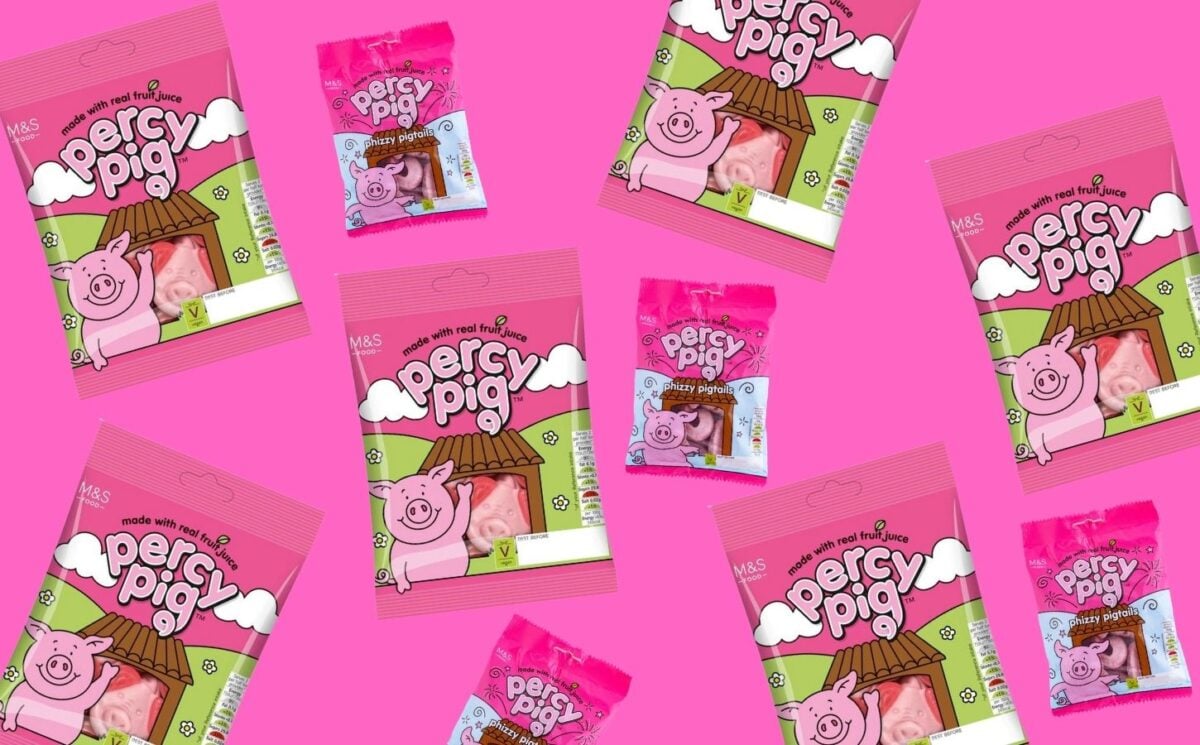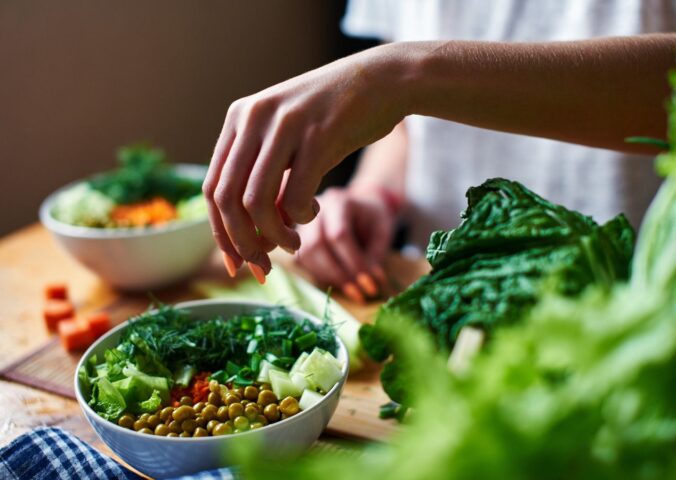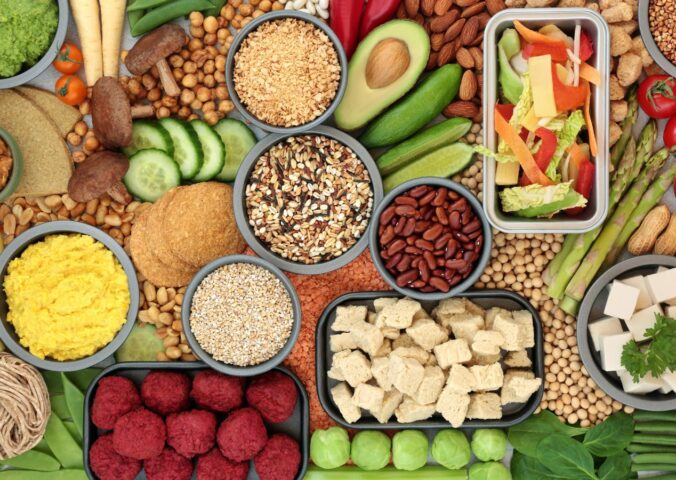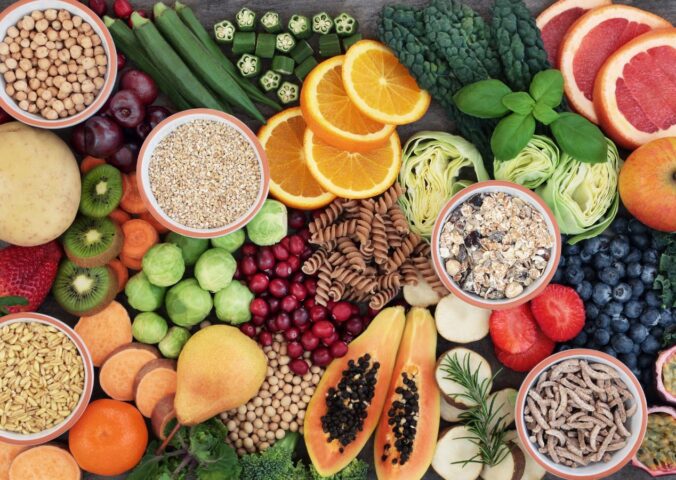Percy Pig might not make everybody’s list of national treasures, but after more than 30 years – and with known superfans ranging from Lewis Hamilton to Andy Murray – Percy is a British icon in his own right. If you’re new to a plant-based diet and want to know if Percy Pigs are vegan, read on…
High-end UK supermarket chain Marks & Spencer has produced the gummy, foamy, fruit-flavored sweets since 1992, and they’re more popular today than ever. In fact, the company says that it sells 16 million packets per year—that’s around 30 bags of Percy Pigs per minute.
Percy Pigs have always been made using natural colors and flavors, and Marks & Spencer has introduced a few different variations over the years including Reversey Percy (gummy with foam ears), Penny Pig (citrus and orange flavor), and a Limited Edition Christmas version (complete with a small red Christmas hat), along with countless others.
Percy Pig himself even made Vogue’s Hot 100 list in 2008 – the first and only entry for a fictional anthropomorphized pig, as far as we know – and is now voiced by current Spider-Man actor Tom Holland in Marks & Spencer’s Christmas adverts. That’s quite the CV.
But are Percy Pigs actually vegan? And what are some of the ingredients common in these gummy and foam-style sweets that aren’t vegan? Here’s what you need to know.
Are Percy Pigs vegan?

The short answer is yes! Percy Pigs are now vegan. Flavoured with apple, mandarin, elderberry, and grape, the gummy candies are now completely free from animal products, which the company said was in response to overwhelming customer demand.
Marks & Spencer officially removed pork gelatin (also spelled “gelatine”) from all varieties back in 2019 – to no small amount of criticism from Piers Morgan – in order to make Percy Pigs suitable for vegetarians. Pork gelatin is made by processing the hooves, skin, bones, cartilage, and tendons of real life pigs, a fact that made some uneasy when combined with Percy himself.
In fact, the brand had first introduced vegetarian Percy Pigs complete with a green package and clear labelling a few years previous, and had since chosen to overhaul the entire range.
“For the last eight years we have been working to help our favorite pig move away from using pork gelatine,” posted Marks & Spencer on X, formerly known as Twitter, at the time. “We learned a lot when removing gelatine from our Colin range in 2014, and in 2016 launched our first Percy with our new gelatine-free recipe.”
The brand added that it had “progressively introduced the new recipe across all its Percy range” in that year, meaning that the sweets would be “100 percent gelatine-free” and “enjoyed by everybody.”

However, at the time, Percy Pigs were still unsuitable for vegans due to the beeswax (food additive code E901) which is commonly used as a glazing agent in candy and other sweets. Marks & Spencer continued with the vegetarian recipe for a few more years until 2022 when it finally removed the beeswax and even labelled the packaging clearly as “vegan.”
Problems with gelatin
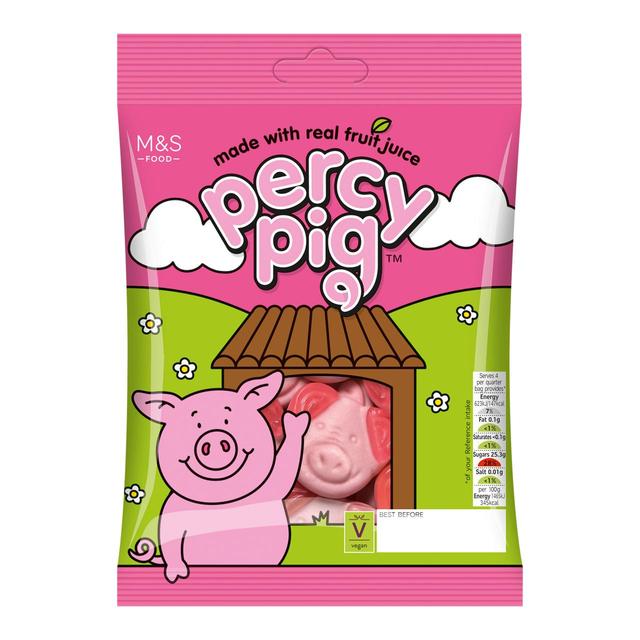
Marks & Spencer moved away from animal products so that Percy Pigs can be enjoyed by everybody, but gelatin remains ubiquitous in pick-n-mix style sweets and candies.
However, even though many of the most popular mainstream gummy sweets – such as Haribo and marshmallows – still contain gelatin, a recent study revealed that 67 percent of Brits didn’t realize that this meant they were eating animal products, while 35 percent of those surveyed added they were “disgusted” to find out about the reality of gelatin production. (For more details about gelatin production, check out our complete guide here.)
“This research has confirmed our suspicions that shoppers aren’t being made aware of what their favorite sweets truly contain, especially when it comes to gelatin,” said Jamie Laing, co-founder of Candy Kittens, a vegan sweet company that commissioned the survey, at the time.
Regardless of how individuals feel personally about eating the boiled-up bones and skins of animals in s’mores or gummy worms, gelatin production is inextricably linked to animal cruelty and environmental destruction through animal agriculture, with a huge two-thirds of all pigs in the UK raised in factory farms.
While the parts of animals used in gelatin production are considered byproducts of meat and dairy production, Grand View Research valued the gelatin market itself at over USD $6 billion, and much like the leather industry, it is likely animals are killed purely for a share of this profit.
Problems with beeswax
While for some folks beeswax or honey is a more palatable ingredient than actually consuming animals themselves in the form of gelatin, the impact is far-reaching.
For bees, wax is a building block for constructing honeycomb, and it takes about six pounds of honey to produce 1lb of wax. It also takes about 12 hours for a worker bee to produce just eight small wax flakes, and in 2013, global beeswax production reached around 65,000 Mt. (The same year, honey production grew to 1.66 million mt, an increase of 41 percent since 1990)
As with other animal farming, the difference between an independent bee keeper or organic smallholding and an intensive honey farm is significant. There are often conflicting accounts of conditions on bee factory farms, but replacing comb with artificial structures and honey with sugar syrup are fairly standard practices, as is smoking the hive.
In other cases, practices might include killing and replacing the queen bee annually (note: in the wild queens can live up to five years), trimming of wings, and stressful transportation. Breeding different species together can also increase susceptibility to disease, which can then be passed on to countless other pollinators who are essential to their ecosystems.
Finally, bees and other pollinators are under extreme pressure from environmental destruction and global warming. In fact, it was reported earlier this year that nearly 50 percent of US bee colonies died off between April 2022 and April 2023. (If you want to learn more about supporting our small furry pollinator friends, check out this guide here.)
What are the vegan alternatives to gelatin and beeswax?
It’s also worth noting here that there are many alternatives to animal-based gelatin, including “vegetable gelatin” or agar-agar. This product can be used interchangeably with conventional gelatin and is obtained primarily from red algae. (Agar reportedly works particularly well as a gelling agent as it sets more firmly at room temperature than gelatin.)
Marks & Spencer isn’t the only manufacturer of sweets and candies that is moving away from gelatin, and Skittles, Haribo Rainbow Stripes, Jelly Tots and even classics like Fruit Pastilles are all now vegan-friendly in the UK. In fact, when Rowntree’s began making Fruit Pastilles without gelatin, the brand also highlighted a desire for its products to be enjoyed by as many people as possible, just like Percy Pigs.
There are also vegan-friendly alternatives to beeswax, such as Carnauba wax – produced from the leaves of the carnauba palm tree – which is also already used in some of the same types of foods, including liquorice, chewing gum, and sweeties.
Where to buy Percy Pigs (and other vegan sweets)
Those in the UK can purchase products from the extensive Percy Pig range (note: only the sweeties are confirmed vegan-friendly) both in Marks & Spencer’s stores and online. Meanwhile, customers in 150 countries worldwide can now purchase Percy Pigs through British Corner Shop, an online export platform available everywhere from the US to Australia.
If you want to find out more about vegan sweets, there are a variety of digital sweet shops catering specifically to plant-based consumers, including Sweet Yourself Vegan, Vesweeties, The Sweet Store’s Vegan Selection, or Vegan Allsorts. You can also check out some of the links below for more detailed information from us on vegan sweets and treats.
